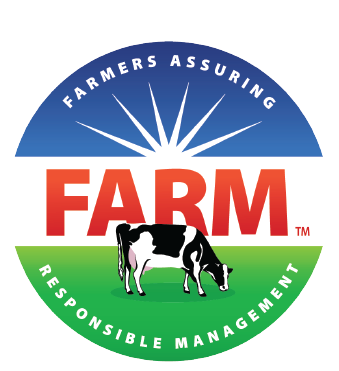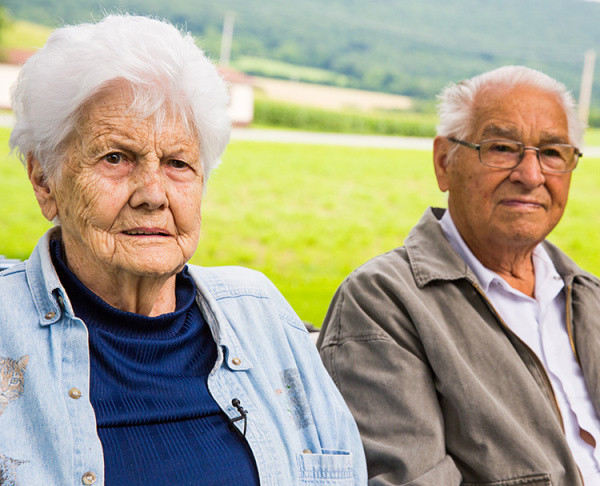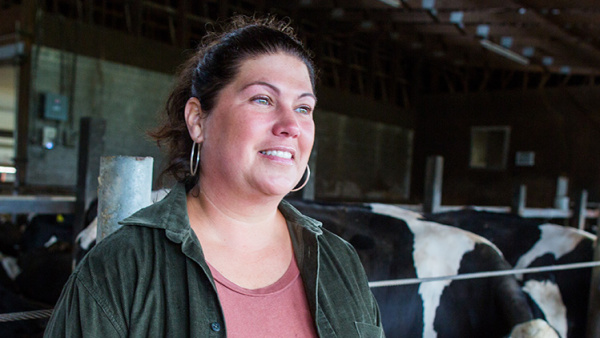- About
- Key Issues
Labor & Rural Policy
Sustainability
Animal Health
Nutrition & Food Safety
Labeling & Standards
- Programs & Resources
- Advocacy
- News
- Membership
- Events
- Stay Informed
- Contact
Dotterer Dairy
Mill Hill, Pennsylvania


A dairy farm originally called Paul Dotterer & Sons is now run by daughters, part of a trend toward more prominent female leadership that’s reinvigorating dairy and agriculture in rural Pennsylvania and across the country.
When Paul Dotterer, who founded the farm with his wife Jean in 1951, and his two sons, Larry and John, transitioned their operations, the 1,250-Holstein dairy in Mill Hill, PA added three women to their management team. Candice White is the dairy manager. Her sister Amanda Condo runs the office and administrative side. Their cousin, Lori Dotterer Butler, is the feed manager. Their fathers still farm with them, but their husbands? They work hard, too – just not at the dairy.
“I feel like there’s now more women coming out and saying they are a farmer,” Candice says. “Women are being empowered about standing beside her husband, not behind him.”
The Dotterer women are the third generation to farm on their operation.
“We know what our grandparents went through to start this business, and then what our dads went through to build the business,” Amanda says. “Every day we strive to continue that legacy and to do the best for our land and for our animals so that the farm is here for our children that want to come back.”
Candice, Lori and Amanda all came back to the dairy for different reasons.
Candice needed to borrow a vehicle from her dad after the transmission went out on her car. He expected payment in hours on the dairy and once the sweat equity turned into a passion, Candice never left.
Lori came back to the farm after pursuing a degree in environmental biology from Mansfield University to look for jobs over the summer. Her responsibilities grew and after a while, she was no longer looking for jobs.
Amanda just missed the farm life.
“Being here, I still get to see our grandfather who started the farm,” Amanda says. “He’s 94 years old and still comes to work every day. He still planted a few acres of corn this year.”

The Dotterer’s ship their milk to Land O’ Lakes, where Amanda served as a regional delegate for their area and is running for election again this year. The co-op is one of the world’s largest female-led companies, with CEO Beth Ford in charge of an organization whose success heavily influences Dotterer Dairy’s future, Amanda said. For example, advances in rural broadband advocated by the Land O’Lakes-led American Connection Project Broadband Coalition would significantly help the operation.
“We have an internet set up that’s pinging from one antenna to another antenna, to a satellite, and finally to the dairy,” Amanda says. “The cable for the actual internet is a quarter mile away from us, but we can’t get it because it would cost thousands of dollars for them to run that line back here. The setup that we have works but it’s not great.”
Land O’Lakes has also aided the farm through a Conservation Dairy assessment to develop an accurate, insights-based picture of its sustainability efforts. These assessments – which include a National Dairy Farmers Assuring Responsible Management (FARM) Environmental Stewardship evaluation – collect more than 250 data points, including electricity and water usage, nutrient application, crop rotation and manure management, which together assemble a big picture of how the farm is taking care of the environment.
The Dotterer’s also were early adopters of no-till soil management, and Lori says they host conservation days to show other farmers how the practice affects their soil. They have also implemented grass waterways and work to continuously improve other facets of their operation.
Lori writes the farm’s nutrient management plan and updates it annually to highlight the Dotterer Dairy’s commitment to land stewardship. “When we have an inspection done and they find something we can improve upon, we do our best to implement those best management practices as soon as we can,” she says.
Amanda says they maintain the same attitude when it comes to their cows. Dotterer Dairy participates in the FARM Animal Care program and relies on its evaluations to help them better track the results of their improvements. From training documentation to dairy cattle ethics agreements and training, she says they make heavy use of FARM resources.
Agriculture is a part of the larger society, and just as women have gained greater leadership everywhere from corporate boardrooms to the executive branch of government, farms are seeing their own shift – not that old habits have completely evaporated. Candice says salesmen still come to the farm and ask her if they can speak with “the farmer,” or ask if her husband is around. Dealing with negative consumer perceptions about dairy is also difficult, but she says they are always trying their best.
“I wish more people understood we work long, hard hours, and sometimes sacrifice our own family things to be here at the farm, just for a small few to be so hurtful and attack the people that are trying to help feed the world,” Candice says.
Seeing the land prosper, their animals thrive, and their family’s legacy continue makes it all worthwhile, she says.
Candice’s advice for other women in the industry pursuing whatever life they have chosen: “You can do it. Good luck.”
